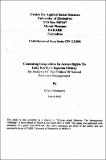| dc.contributor.author | Nyikahadzoi, Kefasi | |
| dc.coverage.spatial | Zimbabwe | en_GB |
| dc.date.accessioned | 2014-10-16T10:32:21Z | |
| dc.date.available | 2014-10-16T10:32:21Z | |
| dc.date.issued | 2002-03 | |
| dc.identifier.citation | Nyikahadzoi, Kefasi (2002) Contesting Inequalities In Access Rights To Lake Kariba’s Kapenta Fishery An Analysis Of The Politics Of Natural Resource Management, CASS Occasional Paper No. 112. Harare, Mt. Pleasant : CASS. | en_GB |
| dc.identifier.uri | https://opendocs.ids.ac.uk/opendocs/handle/20.500.12413/4795 | |
| dc.description.abstract | The pelagic fishery of Lake Kariba is shared between Zimbabwe and Zambia. The fishery exploits the freshwater sardine, the ‘kapenta’ (Limnothrissa miodori). In 1999, the governments of the two countries established a protocol for joint management of the fishery. The protocol sets the agenda for what each country does in the management of kapenta within its jurisdiction. The management objective of the protocol is to ensure that the yield from kapenta is ecologically sustainable and economically viable within an equitable framework. To achieve this objective each country is supposed to develop a management plan, within the framework of the protocol, which takes the historical and political context of each country into consideration. The Zambian government adopted a community-based integrated management system that encompasses both the inshore and the kapenta fishery. In Zimbabwe, the colonial era left a depressing legacy of an extremely unequal distribution of resources between blacks and whites. On the Zimbabwean side, the question of redistributing permits from bigger to smaller firms and from white to black operators according to national policies has been the overall management issue. The process has generated a lot of conflicts between fishers and the state. Fishers are left out of decision-making. This paper explores the tension and interplay between the state and fishers that is structured by the political need to address historical imbalances. | en_GB |
| dc.description.sponsorship | This paper was published with assistance of a grant from NORAD. | en_GB |
| dc.language.iso | en | en_GB |
| dc.publisher | Centre for Applied Social Sciences, University of Zimbabwe. | en_GB |
| dc.relation.ispartofseries | CASS Working Paper - NRM Series;CPN 112/ 2001. | |
| dc.rights.uri | http://creativecommons.org/licenses/by-nc-nd/3.0/ | en_GB |
| dc.subject | Rights | en_GB |
| dc.subject | Trade | en_GB |
| dc.subject | Water | en_GB |
| dc.title | Contesting Inequalities In Access Rights To Lake Kariba’s Kapenta Fishery An Analysis Of The Politics Of Natural Resource Management. | en_GB |
| dc.type | Series paper (non-IDS) | en_GB |
| dc.rights.holder | University of Zimbabwe. | en_GB |


